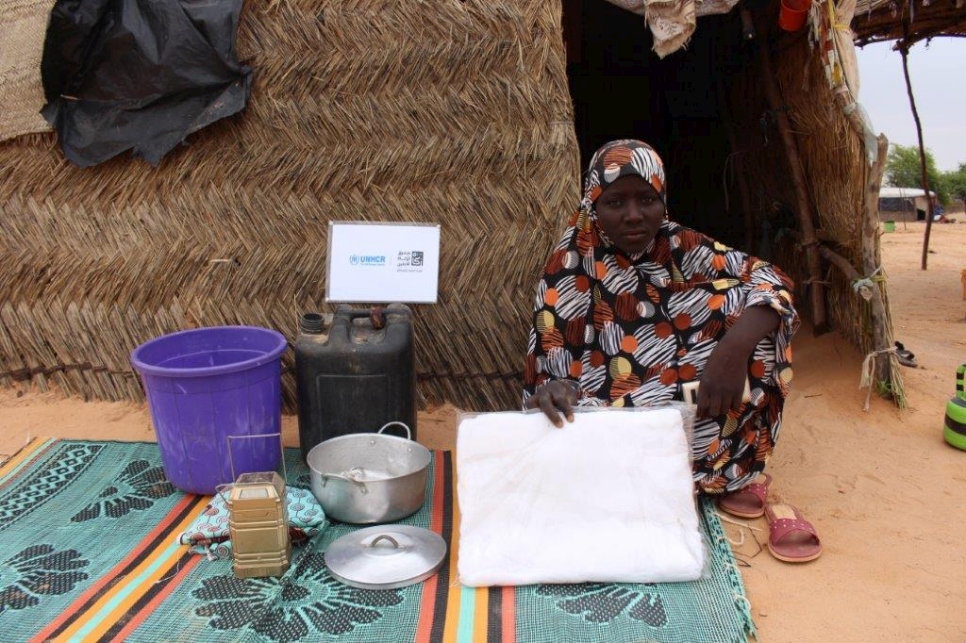
Salleye Seydou living at the IDP site of Ouallam in the Tillabery region of Niger showing gratitude after receiving her core relief items offered with the support of the Refugee Zakat Fund.
© UNHCR/ Boubacar Younoussa Siddo
Under the title ‘Islamic Philanthropy – Transforming the Lives of the World’s Displaced’, UNHCR, The UN Refugee Agency, launched its Annual Islamic Philanthropy Report today, highlighting the impact of Zakat, Sadaqah, and Sadaqah Jariyah donations received through its Refugee Zakat Fund.
In 2020, UNHCR supported 2.1 million vulnerable refugees and internally displaced people through Zakat and Sadaqah funds, thanks to institutional partners and philanthropists across the region and globally. In comparison to 2019, Zakat donations witnessed in 2020 an increase of 12.5%, triggering a significant growth in Zakat beneficiaries at 59%.
Contributions received helped UNHCR in providing lifesaving support through the distribution of cash assistance and goods, allowing refugees and internally displaced people (IDPs) to address immediate needs including shelter, food, education, healthcare, and debt repayment. Furthermore, the support provided helped refugees and IDPs to effectively address economic hardships that were further exacerbated by the ongoing COVID-19 pandemic.
Commenting on the impact of Islamic philanthropy on marginalized communities, H.E Prof. Dr. Koutoub Moustafa Sano, Secretary General of the International Islamic Fiqh Academy stated: “It is heart-warming to see that UNHCR, in its humanitarian response efforts, has succeeded to rely on the foundations of Islamic economics, which entails a complete way of life, realizes comprehensive social development, and is based on noble values, good morals and social justice.”
“With more than 50% of the refugees and IDPs coming from OIC countries, the Muslim community responded with generosity to UNHCR’s Refugee Zakat Fund, in particular in the context of the consequences of the pandemic. But the needs are still high, and there is much space left to cover for the expenditures of Zakat-compliant activities,” added Sano.
Of the 2.1 million beneficiaries of UNHCR’s Refugee Zakat Fund, nearly 1.6 million persons have directly benefitted from Zakat funds in 10 countries: Yemen, Lebanon, Bangladesh, Jordan, Egypt, Iraq, Mauritania, India, Niger and Pakistan. The remaining 0.5 million beneficiaries have benefitted from Sadaqah, Sadaqah Jariyah and purification funds across multiple locations including Chad, Sudan, and Ethiopia.
UNHCR’s Senior Advisor on Islamic Philanthropy and Representative to the Gulf Cooperation Council Countries, Khaled Khalifa said: “We are immensely grateful for the unwavering support and trust of our donors and institutional partners, which allowed us to support over 2 million refugees and IDPs. This growing impact is testament to the pivotal role and potential of Islamic Philanthropy in addressing pressing humanitarian crises. We look forward to further expanding our programmes in offering safe, effective and innovative solutions in responding to the needs of those who have been forcibly displaced.”
Despite the growth that the Refugee Zakat Fund has witnessed due to generous contributions by individuals and institutional partners, the ongoing COVID-19 pandemic has widened the gap between the needs of displaced families and funds received. To address the unmet needs of these vulnerable populations in 2021, UNHCR has projected global budget needs at US$9.1 billion, of which US$2.7 billion are needed in countries where it will be distributing Zakat, to provide lifesaving support to 24.2 million people in Jordan, Lebanon, Yemen, Iraq, Mauritania, Egypt, Bangladesh, India, Pakistan, Thailand, Iran, Nigeria, Burkina Faso, and Somalia.
“With the Holy month of Ramadan upon us, we urge everyone to continue supporting refugees and displaced families who will welcome Ramadan in incredibly difficult circumstances, either through prayers, kindness, or Sadaqah and Zakat”, added Khalifa.
Zakat and Sadqah donations to refugees in urgent need can be given now via zakat.unhcr.org and UNHCR’s newly launched Zakat mobile application “GiveZakat”.
In a bid to strengthen partnerships with Zakat institutions and donors, the Refugee Zakat Fund was launched by UNHCR in 2019, harnessing the power of Zakat and Sadaqah to transform the lives of refugees and IDPs. The fund is backed by more than 10 fatwas, most recently from the International Islamic Fiqh Academy and Al Azhar’s Islamic Research Academy. Moreover, the fund is subject to strict governance, ensuring the utmost transparency at every step – from donation to provision of assistance. In 2020, the fund has helped 2.1 million beneficiaries in 13 countries including Yemen, Lebanon, Iraq, Jordan, Egypt, Mauritania, Niger, Bangladesh, India, and Pakistan, through Zakat & Sadaqah donations.
For more information about the Refugee Zakat Fund, click on the following link:
Share on Facebook Share on Twitter